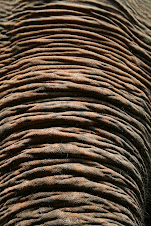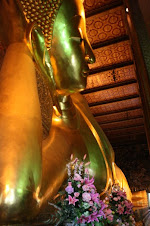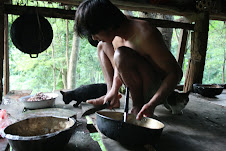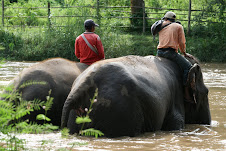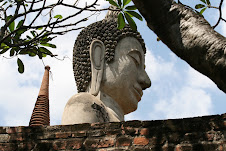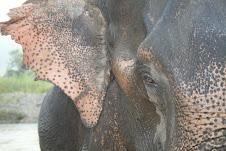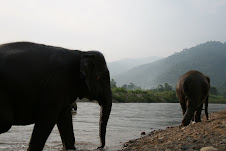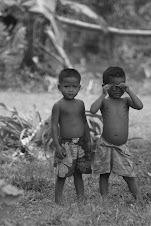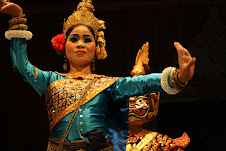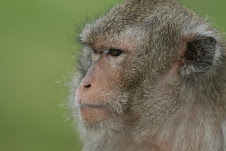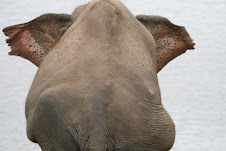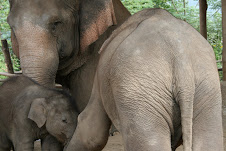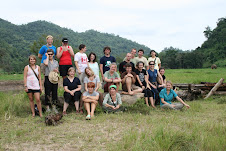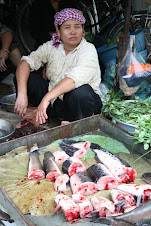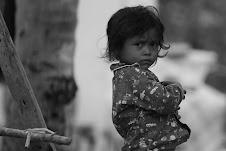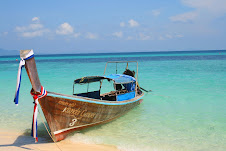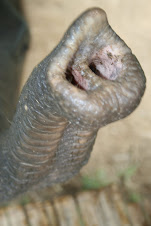Thursday, September 17, 2009
Friday, August 28, 2009
"The real treasure, that which we all seek, is never very far; there is no real need to seek it in a distant place, for it lies buried within our own hearts. And yet, there is this strange and persistent fact, that it is only after a journey in a distant region, in a new land, that the way to that treasure becomes clear." Heinrich Zimmer
Thursday, March 12, 2009
Tuesday, March 10, 2009
A Journey with the Elephants of Thailand
I’ve lost track of the days already. We’re moving like bandits through the dark sheath of night. I’m on the overnight train from Bangkok to Chiang Mai, and believe me, this is no European speed train. I feel every crick and turn in the tracks like old bones. We are journeying fourteen hours north to the jungle to volunteer at the Elephant Nature Park. I fell asleep quickly in my bottom bunk; Terra is up top. It’s surprisingly comfortable. I woke up wondering if we were almost there, then looked out the window and saw nothing but the pitch black breath of night. No city lights, only the dark and my ghostly reflection starring back at me, a mere silhouette.
When it came down to it, deciding what I was going to do after graduating college was much more difficult than I had anticipated. For four years it had been easy to tell people my life aspirations, career goals I may one day achieve, to convince myself and others that I had it all under control. But as my final fall semester faded into the sunny days of spring, as May and the day of graduation quickly reared around the corner, as the reality of my situation came into light, I suddenly realized I had to figure something out, fast.
I am an avid traveler; in fact I have a difficult time staying in one place for too long. Most people in their early twenties, me included, don’t know exactly what they want to do career-wise, but I do know entering the "real world" involves pursuing my dreams of bringing awareness to wildlife and nature conservation issues around the world through writing and photography. During my senior year of college, after wandering the aisles of one of my favorite outdoor stores, I invested in a Green Volunteers book. I anxiously bought it and immediately thumbed through the pages over and over, stopping to dog ear the most enticing pages. There were places all over the world to go and help out and after narrowing down my options over the course of a few months, I chose the Elephant Nature Park, an hour and a half outside of Chiang Mai in Thailand.
I didn’t want to go be a tourist, I wanted to go and help the country out. I wanted to immerse myself in what was important to me and that was helping save abused wildlife, learn more about their situation to see what I could do to help, and go somewhere so beyond my normal life that I was forced to rethink what was truly important. Being absorbed in another culture, in another way of life, ignites something inside, makes me question my purpose in life and how I’m living. What can I do to help others? So many people have told me, “you don’t have to leave to find yourself…” and they’re right, in a way. I know me. I’m just digging deeper, seeing what is so far outside of me that I’m broken into a stronger, tamer, wiser, and more peaceful being. I wanted to go to do something for others besides myself and bring light to the atrocities that are occurring with the Asian elephants in Thailand. So I set the date. September 10th, 2008 it was. I took the money I saved in a bank account from babysitting in high school and money from my graduation and had just enough to volunteer five weeks and travel five weeks, through Thailand, Laos, and Cambodia.
I got lost trying to count the stars as we jerked across the terrain, the engine purring and rattling beneath my body. I am too excited to sleep anymore. Now, it is that time of morning when the sky has swallowed the stars, when the moon hasn’t quite left and the sun hasn’t completely shed its golden hue. I can make out mountains lumbering across the landscape like giant jade creatures in the distance. Thai style teak homes on stilts dot the landscape while small groups of prehistoric-looking chickens chase scrawny dogs across the parallel tracks. It is growing brighter each minute and now I can see the lush green foliage blanketing hills, banana trees everywhere. I can picture the elephants here, wandering with their herds.
In reference to the Asian elephant situation, many people choose to focus on the wild elephant population in Thailand. While this is a very grave issue and one that needs attention, I believe not enough people focus on elephants already in captivity. At the turn of the 20th century, there were an estimated 100,000 Asian elephants in Thailand. Today, there is a disturbingly low 3,000-4,000; half of which are domesticated, with only 30,000 total Asian elephants living in all of Asia. The treatment most of these elephants receive in captivity is appalling and often leads to psychiatric issues, infection, and death. Most captive elephants in Thailand today are used in the ever popular tourist industry, which grew rapidly after logging was banned in Thailand in 1989. Thousands of elephants were displaced and had no future returning to the wild. Thus, elephant trekking and elephant shows became popular attractions, while others were sold to the Burmese border where logging is still legal.
After returning home, one of the most frequently asked questions was if I rode an elephant while in Thailand. I’ll have to admit, before learning all I did about the elephants, I wanted to ride one, badly. I dreamed of sitting atop their massive backs, stroking the tough hide between their ears and gleaming while trekking through a verdant jungle. That was until I met Sangduen (Lek) Chaillert, and her rescued elephants.
Lek, a native Thai born in a Northern hilltribe, is the founder of the Elephant Nature Park. Since she can remember, her family has always owned an elephant to help with daily chores. In the early 1990’s, Lek, which ironically means small in Thai, established the Elephant Nature Park to house abused working elephants and provide them with a sanctuary to live the rest of their lives in peace.
For over 400 years Thailand has used the pajan, a wooden contraption built to restrain a baby elephant, to break their spirit, to force it to submit and follow a mahout’s, the elephant trainer’s, orders. At three years old, the baby elephant is taken from its mother and forced into the wooden crush, then chained. For one to two weeks, it is beaten twenty-four hours a day with sharp metal spikes prodded into their sides, head, feet, and ears. Men sit on their backs and hammer hooks into their foreheads, blood streaming down their faces, as they scream for their mothers, terrified. This is why the mahout, always carries around a bull hook. At the sight of the hook, the elephant does what it is commanded to do or is hit.
Food and water are placed just out of reach. Once their spirit has been broken, they surrender to the humans and obey. Fifty percent of the elephants die during this torturous process, but the Thai trainers just don’t seem learn their lesson or care. They are taught to kick soccer balls into excited, clueless crowds, paint pictures, sit on their hind legs, and even shoot darts at blown up balloons.
With a giant bench atop their backs, elephants carry tourists through jungles, trekking. They wear the harnesses and benches for hours on end, rubbing their tough hide raw, leading to forty percent of the elephants living with open, infected sores.
In Bangkok and other large cities, baby elephants are brought into the city and forced to perform a number of acts for eager tourists on the streets. Tourists pay to feed them bananas and even share beer with them. Often times, the elephants have been fed amphetamines in order to work late into the night. Since elephants have a large amount of sensitivity in their feet, the asphalt and chaotic cars, motorbikes, and trucks passing by stress them out completely, as can be witnessed in their distraught, widened eyes. Every year many elephants and mahouts are killed or badly injured by oncoming traffic.
Lek believes it is completely unnecessary to train an elephant in such a manner, especially with their level of intelligence. While she would rather see them return to the wild, she knows that once they are domesticated they cannot go back to the jungles that are disappearing day by day. Even if they could return to the wild, there is not nearly enough jungle for them to live in. With a growing agricultural demand from Thailand, the once infinite, pristine jungles are vanishing with every breath.
When Lek rescued and nursed a baby elephant she named Hope back to health after nearly dying when his mother was shot, she was able to train him with positive reinforcement. Similar to the way one would train a dog. She was able to prove to the Thai people that elephants can learn this way, that the pajan is completely uncalled for.
“I have been attacked by a lot of people, especially tourist companies. They think I am trying to change four-hundred years of culture. I’ve had death threats and had people try to kick me out of the country. They say I am changing Thailand,” revealed Lek in a heart-felt interview.
And she is trying to change it, for the better. Government officials have acknowledged Lek’s methods of training elephants and have invited mahouts to stay at the Elephant Nature Park to learn how to treat elephants in a new manner and with a new found respect.
We are living in a bamboo tree hut. Mosquito netting, like giant iridescent jelly fish, hangs from a bamboo rafter and engulfs our small beds. At night it is silent except the click of our tiny oscillating fan giving us each a short breath of cool air, and the geckos chirping, a sound I’ve never heard until I got to Thailand. I thought they were bats until I saw them clinging to the tin roof one night, stalking insects.
We are settled on 500 acres in the verdant Mae Taeng valley, with a river running through. We go twice a day to bathe the elephants there and usually end the day floating in the current downstream in all of our work clothes.
I awaken around 6:00 AM to the grunts and songs of the mahouts calling to their elephants, who reply with a series of boisterous trumpets. Water buffalo bellow in the distance, at least a few of the 45 rescued dogs are fighting, and then my alarm lets me know it’s 6:30 and already time to wake up. It’s taken me a few days to get used to seeing elephants walk past my windows and head out into the sunrise. Fog hovers around the base of the mountains like a mirage as radiant beams of color explode across the newly brightened sky: a freshly painted watercolor every morning. The fog moves slowly, draping itself like an opaque pashmina over the hills and by breakfast has vanished. Elephants and their mahouts amble into the morning, ready for another day.
The mornings are as cool and refreshing as they are in late afternoon after a much appreciated down pour. Another day of hard, rewarding work starts at these early hours. Each day, we perform a variety of chores, with different people. None of this would be possible without the volunteers. I am here, making a difference with my own two hands, with my sweat and eagerness for change.
The perspiration from my brows is now dripping into my eyes and stinging. I look up, between rows of dried corn stalks, and wipe my forehead with the back of my dirty left hand, then get back to chopping. It seemed so exciting when we first got to the corn fields and they gave us the machetes. I had someone snap my photo with the jade mountains, aisles of dried corn stalks, and banana trees in the background, machete in hand. All I can think now, is this is for the elephants. I keep reminding myself why I’m here in this humid heat. I’m from Texas, and should be used to it by now. But there’s just no way.
The ears have already been plucked from their stalks weeks ago and now we are clearing the fields for replanting and because the elephants tend to enjoy the stalks as well. I chop the stalks one by one and make piles of them. The Thai women follow behind me and tie them into bundles that I carry on my shoulders to the back of the truck. It’s been thirty minutes and I feel like I’m melting. ‘It’s for the elephants I keep telling myself.’
I came to the Elephant Nature Park three days ago. I was warned that corn cutting was the most tiring task, but well worth it in the end, once you saw how much the elephants appreciated the stalks. After today, I don’t think I ever want to see a machete or a field of corn again. I keep looking around at the Thai women, dressed in long sleeves, pants, hats, and face masks and can’t believe they do this every day just to survive, just to feed themselves and their families. I suddenly have a new found respect for hard labor. After carrying a giant bundle to the truck I go around to the front to find my water bottle hanging from the rearview mirror, baking in the sun. I crouch down in a sliver of shade on the side of the truck, open the top and take a big swig of the hottest water I’ve ever drunk; hardly enough to replace what I’ve sweated out already. ‘It’s for the elephants.’
My allergies are going wild with every whack of the machete, dust and dried bits of plant matter stick to my wet face and fly up my nose. My index finger has formed a large blister and is bleeding from the machete. Then, the Thai lady following me laughs a high pitched laugh as she comes over to me and turns the blade over in my hand. I had been using it backwards for the past half hour. Excellent.
Once the truck is completely filled to the brim with stalks, I climb up the side of the cage attached to the bed of the truck and sit on top of dried cushiony vegetation. As the truck lunges into gear we bounce down the dirt road, the wind hitting our faces, and I smile. The closest thing I’ve had to air conditioning since I arrived in Thailand. “This is the best part,” Janna tells me, her blonde hair whipping in the wind. She’s been a volunteer for over a year.
Of the thirty-three elephants here, I’ve grown closest with Jokia. Her name means eyes of heaven. As a logging elephant in Burma, she was impregnated, due to the valuable worth of the calf. Jokia was forced to continue painstakingly tear down areas of jungle tree by tree by pulling with all of her strength with a harness and chains attached to her body, late into her pregnancy. While working hard one day, she gave birth to her baby on the side of a mountain. The newborn rolled down the side of the mountain and was killed. Jokia mourned for her lost child and refused to work. Her unsympathetic owners shot stones at her eyes with sling shots to force her back to work and blinded her completely.
Jokia is very gentle. During feeding time I guide her trunk with one hand to the other, holding a pineapple or a bunch of bananas. She coils her muscular trunk around the fruit, feeds herself, and is back for more while still chewing. I forgot to take my ring off earlier today and she nearly ate it! I had to fish it out of her powerful trunk before she swallowed it.
Each elephant here has a story. From Max, who was hit by an 18 wheeler in Bangkok, to Medo, who was chained to a tree and forcefully impregnated, refused in the process, and broke her hips and back in the end, leading to permanent disfigurement, to Malai Tong who had part of her foot blown of by a landmine and must receive daily medical treatment and rehabilitation exercises..
These elephants all came here, untrusting of human beings, without much hope of survival, without any family members. They have all found love with each other and have formed several small herds, protecting each other. They are no longer beaten or forced to work, and have grown to trust humans again, thanks to Lek and the volunteers. They now have a place to peacefully live out the rest of their lives.
It’s amazing to have all these people of all ages, all walks of life, from all over the world come together as one force to change the fate of the Asian elephant and of Thailand; to raise awareness, especially our own. This journey has been tough. It’s been chaotically beautiful and horrifically truth revealing; but what I wanted and needed. I now whole-heartedly believe in volunteer travel. Not only is it the least I can do as a human being, sharing the earth with other creatures, but it is the most intimate way to develop a relationship with a country and aid in changing the fate of the future. After all, we do all live on one foundation and if we don’t step up to help, who will?
How Can You Help?
www.elephantnaturepark.org
When it came down to it, deciding what I was going to do after graduating college was much more difficult than I had anticipated. For four years it had been easy to tell people my life aspirations, career goals I may one day achieve, to convince myself and others that I had it all under control. But as my final fall semester faded into the sunny days of spring, as May and the day of graduation quickly reared around the corner, as the reality of my situation came into light, I suddenly realized I had to figure something out, fast.
I am an avid traveler; in fact I have a difficult time staying in one place for too long. Most people in their early twenties, me included, don’t know exactly what they want to do career-wise, but I do know entering the "real world" involves pursuing my dreams of bringing awareness to wildlife and nature conservation issues around the world through writing and photography. During my senior year of college, after wandering the aisles of one of my favorite outdoor stores, I invested in a Green Volunteers book. I anxiously bought it and immediately thumbed through the pages over and over, stopping to dog ear the most enticing pages. There were places all over the world to go and help out and after narrowing down my options over the course of a few months, I chose the Elephant Nature Park, an hour and a half outside of Chiang Mai in Thailand.
I didn’t want to go be a tourist, I wanted to go and help the country out. I wanted to immerse myself in what was important to me and that was helping save abused wildlife, learn more about their situation to see what I could do to help, and go somewhere so beyond my normal life that I was forced to rethink what was truly important. Being absorbed in another culture, in another way of life, ignites something inside, makes me question my purpose in life and how I’m living. What can I do to help others? So many people have told me, “you don’t have to leave to find yourself…” and they’re right, in a way. I know me. I’m just digging deeper, seeing what is so far outside of me that I’m broken into a stronger, tamer, wiser, and more peaceful being. I wanted to go to do something for others besides myself and bring light to the atrocities that are occurring with the Asian elephants in Thailand. So I set the date. September 10th, 2008 it was. I took the money I saved in a bank account from babysitting in high school and money from my graduation and had just enough to volunteer five weeks and travel five weeks, through Thailand, Laos, and Cambodia.
I got lost trying to count the stars as we jerked across the terrain, the engine purring and rattling beneath my body. I am too excited to sleep anymore. Now, it is that time of morning when the sky has swallowed the stars, when the moon hasn’t quite left and the sun hasn’t completely shed its golden hue. I can make out mountains lumbering across the landscape like giant jade creatures in the distance. Thai style teak homes on stilts dot the landscape while small groups of prehistoric-looking chickens chase scrawny dogs across the parallel tracks. It is growing brighter each minute and now I can see the lush green foliage blanketing hills, banana trees everywhere. I can picture the elephants here, wandering with their herds.
In reference to the Asian elephant situation, many people choose to focus on the wild elephant population in Thailand. While this is a very grave issue and one that needs attention, I believe not enough people focus on elephants already in captivity. At the turn of the 20th century, there were an estimated 100,000 Asian elephants in Thailand. Today, there is a disturbingly low 3,000-4,000; half of which are domesticated, with only 30,000 total Asian elephants living in all of Asia. The treatment most of these elephants receive in captivity is appalling and often leads to psychiatric issues, infection, and death. Most captive elephants in Thailand today are used in the ever popular tourist industry, which grew rapidly after logging was banned in Thailand in 1989. Thousands of elephants were displaced and had no future returning to the wild. Thus, elephant trekking and elephant shows became popular attractions, while others were sold to the Burmese border where logging is still legal.
After returning home, one of the most frequently asked questions was if I rode an elephant while in Thailand. I’ll have to admit, before learning all I did about the elephants, I wanted to ride one, badly. I dreamed of sitting atop their massive backs, stroking the tough hide between their ears and gleaming while trekking through a verdant jungle. That was until I met Sangduen (Lek) Chaillert, and her rescued elephants.
Lek, a native Thai born in a Northern hilltribe, is the founder of the Elephant Nature Park. Since she can remember, her family has always owned an elephant to help with daily chores. In the early 1990’s, Lek, which ironically means small in Thai, established the Elephant Nature Park to house abused working elephants and provide them with a sanctuary to live the rest of their lives in peace.
For over 400 years Thailand has used the pajan, a wooden contraption built to restrain a baby elephant, to break their spirit, to force it to submit and follow a mahout’s, the elephant trainer’s, orders. At three years old, the baby elephant is taken from its mother and forced into the wooden crush, then chained. For one to two weeks, it is beaten twenty-four hours a day with sharp metal spikes prodded into their sides, head, feet, and ears. Men sit on their backs and hammer hooks into their foreheads, blood streaming down their faces, as they scream for their mothers, terrified. This is why the mahout, always carries around a bull hook. At the sight of the hook, the elephant does what it is commanded to do or is hit.
Food and water are placed just out of reach. Once their spirit has been broken, they surrender to the humans and obey. Fifty percent of the elephants die during this torturous process, but the Thai trainers just don’t seem learn their lesson or care. They are taught to kick soccer balls into excited, clueless crowds, paint pictures, sit on their hind legs, and even shoot darts at blown up balloons.
With a giant bench atop their backs, elephants carry tourists through jungles, trekking. They wear the harnesses and benches for hours on end, rubbing their tough hide raw, leading to forty percent of the elephants living with open, infected sores.
In Bangkok and other large cities, baby elephants are brought into the city and forced to perform a number of acts for eager tourists on the streets. Tourists pay to feed them bananas and even share beer with them. Often times, the elephants have been fed amphetamines in order to work late into the night. Since elephants have a large amount of sensitivity in their feet, the asphalt and chaotic cars, motorbikes, and trucks passing by stress them out completely, as can be witnessed in their distraught, widened eyes. Every year many elephants and mahouts are killed or badly injured by oncoming traffic.
Lek believes it is completely unnecessary to train an elephant in such a manner, especially with their level of intelligence. While she would rather see them return to the wild, she knows that once they are domesticated they cannot go back to the jungles that are disappearing day by day. Even if they could return to the wild, there is not nearly enough jungle for them to live in. With a growing agricultural demand from Thailand, the once infinite, pristine jungles are vanishing with every breath.
When Lek rescued and nursed a baby elephant she named Hope back to health after nearly dying when his mother was shot, she was able to train him with positive reinforcement. Similar to the way one would train a dog. She was able to prove to the Thai people that elephants can learn this way, that the pajan is completely uncalled for.
“I have been attacked by a lot of people, especially tourist companies. They think I am trying to change four-hundred years of culture. I’ve had death threats and had people try to kick me out of the country. They say I am changing Thailand,” revealed Lek in a heart-felt interview.
And she is trying to change it, for the better. Government officials have acknowledged Lek’s methods of training elephants and have invited mahouts to stay at the Elephant Nature Park to learn how to treat elephants in a new manner and with a new found respect.
We are living in a bamboo tree hut. Mosquito netting, like giant iridescent jelly fish, hangs from a bamboo rafter and engulfs our small beds. At night it is silent except the click of our tiny oscillating fan giving us each a short breath of cool air, and the geckos chirping, a sound I’ve never heard until I got to Thailand. I thought they were bats until I saw them clinging to the tin roof one night, stalking insects.
We are settled on 500 acres in the verdant Mae Taeng valley, with a river running through. We go twice a day to bathe the elephants there and usually end the day floating in the current downstream in all of our work clothes.
I awaken around 6:00 AM to the grunts and songs of the mahouts calling to their elephants, who reply with a series of boisterous trumpets. Water buffalo bellow in the distance, at least a few of the 45 rescued dogs are fighting, and then my alarm lets me know it’s 6:30 and already time to wake up. It’s taken me a few days to get used to seeing elephants walk past my windows and head out into the sunrise. Fog hovers around the base of the mountains like a mirage as radiant beams of color explode across the newly brightened sky: a freshly painted watercolor every morning. The fog moves slowly, draping itself like an opaque pashmina over the hills and by breakfast has vanished. Elephants and their mahouts amble into the morning, ready for another day.
The mornings are as cool and refreshing as they are in late afternoon after a much appreciated down pour. Another day of hard, rewarding work starts at these early hours. Each day, we perform a variety of chores, with different people. None of this would be possible without the volunteers. I am here, making a difference with my own two hands, with my sweat and eagerness for change.
The perspiration from my brows is now dripping into my eyes and stinging. I look up, between rows of dried corn stalks, and wipe my forehead with the back of my dirty left hand, then get back to chopping. It seemed so exciting when we first got to the corn fields and they gave us the machetes. I had someone snap my photo with the jade mountains, aisles of dried corn stalks, and banana trees in the background, machete in hand. All I can think now, is this is for the elephants. I keep reminding myself why I’m here in this humid heat. I’m from Texas, and should be used to it by now. But there’s just no way.
The ears have already been plucked from their stalks weeks ago and now we are clearing the fields for replanting and because the elephants tend to enjoy the stalks as well. I chop the stalks one by one and make piles of them. The Thai women follow behind me and tie them into bundles that I carry on my shoulders to the back of the truck. It’s been thirty minutes and I feel like I’m melting. ‘It’s for the elephants I keep telling myself.’
I came to the Elephant Nature Park three days ago. I was warned that corn cutting was the most tiring task, but well worth it in the end, once you saw how much the elephants appreciated the stalks. After today, I don’t think I ever want to see a machete or a field of corn again. I keep looking around at the Thai women, dressed in long sleeves, pants, hats, and face masks and can’t believe they do this every day just to survive, just to feed themselves and their families. I suddenly have a new found respect for hard labor. After carrying a giant bundle to the truck I go around to the front to find my water bottle hanging from the rearview mirror, baking in the sun. I crouch down in a sliver of shade on the side of the truck, open the top and take a big swig of the hottest water I’ve ever drunk; hardly enough to replace what I’ve sweated out already. ‘It’s for the elephants.’
My allergies are going wild with every whack of the machete, dust and dried bits of plant matter stick to my wet face and fly up my nose. My index finger has formed a large blister and is bleeding from the machete. Then, the Thai lady following me laughs a high pitched laugh as she comes over to me and turns the blade over in my hand. I had been using it backwards for the past half hour. Excellent.
Once the truck is completely filled to the brim with stalks, I climb up the side of the cage attached to the bed of the truck and sit on top of dried cushiony vegetation. As the truck lunges into gear we bounce down the dirt road, the wind hitting our faces, and I smile. The closest thing I’ve had to air conditioning since I arrived in Thailand. “This is the best part,” Janna tells me, her blonde hair whipping in the wind. She’s been a volunteer for over a year.
Of the thirty-three elephants here, I’ve grown closest with Jokia. Her name means eyes of heaven. As a logging elephant in Burma, she was impregnated, due to the valuable worth of the calf. Jokia was forced to continue painstakingly tear down areas of jungle tree by tree by pulling with all of her strength with a harness and chains attached to her body, late into her pregnancy. While working hard one day, she gave birth to her baby on the side of a mountain. The newborn rolled down the side of the mountain and was killed. Jokia mourned for her lost child and refused to work. Her unsympathetic owners shot stones at her eyes with sling shots to force her back to work and blinded her completely.
Jokia is very gentle. During feeding time I guide her trunk with one hand to the other, holding a pineapple or a bunch of bananas. She coils her muscular trunk around the fruit, feeds herself, and is back for more while still chewing. I forgot to take my ring off earlier today and she nearly ate it! I had to fish it out of her powerful trunk before she swallowed it.
Each elephant here has a story. From Max, who was hit by an 18 wheeler in Bangkok, to Medo, who was chained to a tree and forcefully impregnated, refused in the process, and broke her hips and back in the end, leading to permanent disfigurement, to Malai Tong who had part of her foot blown of by a landmine and must receive daily medical treatment and rehabilitation exercises..
These elephants all came here, untrusting of human beings, without much hope of survival, without any family members. They have all found love with each other and have formed several small herds, protecting each other. They are no longer beaten or forced to work, and have grown to trust humans again, thanks to Lek and the volunteers. They now have a place to peacefully live out the rest of their lives.
It’s amazing to have all these people of all ages, all walks of life, from all over the world come together as one force to change the fate of the Asian elephant and of Thailand; to raise awareness, especially our own. This journey has been tough. It’s been chaotically beautiful and horrifically truth revealing; but what I wanted and needed. I now whole-heartedly believe in volunteer travel. Not only is it the least I can do as a human being, sharing the earth with other creatures, but it is the most intimate way to develop a relationship with a country and aid in changing the fate of the future. After all, we do all live on one foundation and if we don’t step up to help, who will?
How Can You Help?
www.elephantnaturepark.org
Subscribe to:
Comments (Atom)

